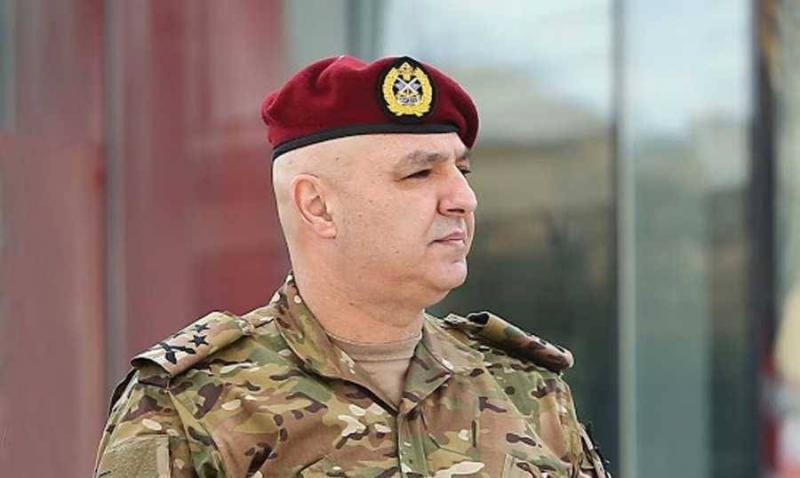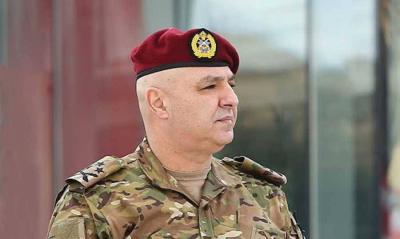The issue of the leadership of the army is increasingly heating up at both governmental and parliamentary levels. What is certain so far is that there will be no vacancy in the army leadership on January 11, when General Joseph Aoun reaches the legal retirement age. It is likely that today's Cabinet meeting will resolve this matter, as indicated by evening communications that confirmed a consensus towards the extension.
In recent days, according to the newspaper "Nidaa Al-Watan," the pace of news regarding the government's decision to postpone the retirement of the Army Commander has accelerated, but informed sources asserted that the situation has not fully matured. While interest in making a decision has risen, the final decision is still pending on the "ideal timing" shielded from shocks, although the conviction has solidified that the extension or postponement of retirement is the easiest and most realistic option.
Parliamentarily, it has become clear that a series of draft laws aimed at extending the terms of the army commander or all security and military leaders have accumulated in the Parliament. The rationale behind this choice lies in the insistence of the Speaker of the Parliament to nullify the accusation of the Parliament's "illegitimacy" in legislating amid the presidential vacancy. Thus, he insists that these projects be part of a comprehensive package, even if the opposition returns to its rejection of legislation. However, simply participating would establish the legitimacy of the Parliament's legislative work, which is what he desires.
Berri has actually been paving the way to open the doors of the Council if absolutely necessary. It is true that he preferred not to see Joseph Aoun's fate differ from that of Abbas Ibrahim or Riad Salameh, meaning that what applies to other positions must also be generalized to the army. However, when he perceived that the head of the Free Patriotic Movement, Gibran Bassil, was eager and enthusiastic about appointing a new commander, he stepped back, rejecting the granting of such a privilege to Bassil and renewed his support for the extension.
On the governmental level, the Secretary-General of the Cabinet, Judge Mahmoud Makiyeh, completed the legal study assigned to him by caretaker Prime Minister Najib Mikati during the Cabinet meeting on October 19, regarding possible solutions to fill the vacancy in the army leadership. The study includes all possible scenarios, starting with appointments and ending with the postponement of retirement, and it considers the surrounding circumstances, starting from the fact that it is a caretaker government, to the circumstances that accompanied the preparations to resolve this issue.
In parallel, political movements aimed at putting all solutions on the discussion table to push the best of them forward have intensified in recent hours. Mikati met on Sunday night with the "two Khalils," Ali Hassan Khalil and Hussein Khalil, to officially inform them of the "duo's" position on the issue, especially since "Hezbollah" seemed inclined not to extend the army commander’s term while Speaker Berri appeared closer at one point to an appointment.
However, the "Khalils" clearly stated that the duo does not oppose the appointment if it can be achieved through consensus, nor do they mind an extension if it can be secured. However, they would prefer not to assign Council member Major General Pierre Saadeh (Catholic) the duties of the commander, and they do not favor, similar to Walid Jumblatt, that leadership falls to the Chief of Staff after his appointment.
Thus, the ball is in Mikati’s court, but he has sought to contain the areas of disagreement with Gibran Bassil and “the Party.” The Prime Minister preferred to reach a settlement with him that would allow the Minister of Defense to present his proposals for military formations to the Cabinet, or otherwise resort to the option of extension or postponement of retirement, as it is the least difficult choice. Mikati and the Shia duo reject going along with Bassil's condition to enforce the signature of all 24 ministers, to prevent recording the illegitimacy of all previous and subsequent government decisions.
In parallel, “Hezbollah” informed Army Commander General Joseph Aoun that there is no objection to the extension, meaning that it does not reject this option if it is available. This has created a sense of relief among those around the army commander in recent days, once they were assured that the “Party” is not on the opposite side. However, this "non-opposition" does not obscure the reality that the Party is still accommodating Bassil, giving him all available time, and prefers a policy of "soft landing" to resolve the issue of army leadership. It is certain that the security and military conditions in the south encourage the Party to maintain the stability of the military institution.
Ultimately, the Party will weigh this decision in the balance of its interests rather than in its relationship with the head of the Free Patriotic Movement, while its relationship with the army commander is good, and the experience of the past month is good evidence of that. Thus, there is no harm in extending his term for six months or a year, especially if Bassil fails to achieve his goal of facilitating the appointment.
In conclusion, it can be inferred that the appointment is a difficult option, firstly, due to Berri's refusal to grant Bassil any gain, and secondly, due to the government's refusal to accept the condition of the 24 ministers' signatures. Therefore, the prospects for extension have risen, and the delayed announcement yesterday evening of a morning session for the government serves as an additional indicator pushing in this direction, after efforts intensified in the evening to resolve the extension issue for the Director-General of Internal Security Forces, Major General Imad Osman, with rumors circulating about his possible invitation to the session.




